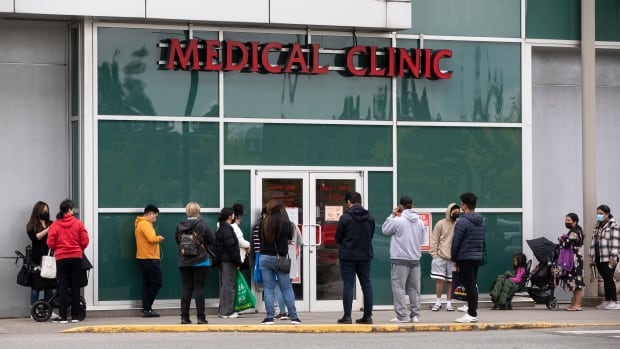Employees of the health services offshoot of Telus Communications are only reimbursed for certain drug prescriptions if they fill them through the company’s own virtual pharmacy, CBC News has learned.
CBC News spoke with three employees of Telus Health who shared screenshots showing details of the new policy, which took effect March 1. It states that the company’s “virtual pharmacy’ is now the “preferred provider” for the group prescription drug plan, saying it has “lower markups and dispensing fees than the industry average.”
- Are you a Telus Health employee? We want to know what you think of the policy. Send an email to ask@cbc.ca.
The employees expressed frustration that they would no longer be able to choose where they filled certain prescriptions unless they paid out of pocket. They were also concerned that they could miss deliveries of vital medications by using the virtual pharmacy, and that those who live in rural areas could be especially affected.
These preferred-pharmacy networks, or PPNs, are arrangements that provide exclusivity between insurers and pharmacy chains. Companies use them to save on prescription drug costs. As the deals become more common in Canada, there’s growing scrutiny about their impact on competition in the pharmacy sector.
Telus Health broadly specializes in virtual health — an industry that exploded during the pandemic.
The Montreal company offers a wide range of services — including pharmacy management, electronic medical record-keeping and emergency services — that are aimed at patients, employers, insurers and health-care professionals. It has a growing network of in-person health clinics across several provinces.

The new policy applies to two types of prescription medications: maintenance drugs, which are taken on a recurring basis to treat conditions like asthma or diabetes; and specialty drugs, which are used to treat complex or life-threatening conditions — like cancer or Crohn’s Disease.
Telus Health is self-insured — meaning that the company and its employees pay for a benefits package, with the company itself responsible for reimbursing the costs incurred from claims. Enrolling in the plan is optional.
Desjardins has a contract with Telus Health for claims processing only, a spokesperson for the insurance company told CBC News. Telus Health then distributes some benefits through its virtual pharmacy.
Steering patients to corporate-owned pharmacy
The new policy is “a pretty bold move” by Telus Health, said Steve Morgan, an expert in pharmacare systems at the University of British Columbia.
He said more insurers are realizing they can save costs by taking on work that would normally be done by a separate firm within the supply chain.
“You think you’re dealing with different entities at different levels of your interaction with the system,” Morgan said. “But in fact, all of those entities are owned by the same player.”
The Canadian Pharmacists Association (CPhA) says on its website that steering employees to specific pharmacies is a growing trend, but its position is that companies should not be able to direct where patients get their medications. It is calling for regulations to restrict PPNs to allow for competition between pharmacies.

Telus Health says move offers advantages
Telus Health said in a statement to CBC News that the policy “is in line with the standard approach” of other pharmacy companies and that the move “offers a range of advantages, including enhanced coinsurance and reduced dispensing fees.”
“In addition, we place great importance on involving our employees in testing and using our services, as their valuable feedback allows us to continuously enhance our offerings for our clients.”
Telus Health, which has acquired several Canadian telehealth companies in recent years, employs approximately 7,000 people. The company did not specify how many were in Canada.
Its employees are not unionized, according to sources.
New research has found for-profit companies behind many virtual care apps are working with pharmaceutical companies to sell products and even selling patient data. Experts say data collected through such apps should be considered personal health info, which would allow patients to opt out. Note: This story has been updated to remove a line identifying some Canadian virtual care companies and some associated imagery.
Staff who work in Quebec will not see any changes because provincial law effectively prohibits such deals.
However, PPNs are used by many of Canada’s major insurers. Sun Life’s PPN includes Express Scripts Canada Pharmacy, InnomarPharmacy and BioScript Pharmacy and is voluntary for the insurer’s employees.
Just a few weeks ago, Manulife announced a deal that would have required patients to fill their specialty drug prescriptions at Loblaw-owned pharmacies in order to be reimbursed. After public backlash, the decision was reversed.
Specialty drugs are particularly expensive in Canada, costing more than $10,000 per patient annually, according to a 2023 drug trend report by Express Scripts Canada.
Because Canadians mostly get private insurance coverage through their workplaces, they can expect to see employers try new strategies to control drug costs, says Quinn Grundy, a researcher who studies the activities of corporations in relation to health care at the University of Toronto.
“Because they are also commercial entities, there is no guarantee that those strategies are putting patient or public interests first,” she said.
“There’s now a situation where the employer’s concerns around cost and revenue are driving that decision, rather than the relationship between a patient and their health provider.”
The three employees who spoke with CBC News said they felt that Telus Health employees were being forced to use the company’s virtual pharmacy. One source noted that under the new policy they would no longer be able to use the pharmacy located near their doctor.
‘Sign of the future’
Telus Health has been described as one of Canada’s largest pharmacy benefits managers (PBM) — another service it offers — by various organizations, including the CPhA.
PBMs, which in the U.S. act as a kind of middleman between insurers, drug manufacturers and pharmacies, have come under heavy scrutiny.
The U.S. Federal Trade Commission is currently probing their practices, including steering patients toward pharmacies owned by PBMs, and their impact on prescription drug access and affordability.
When it comes to the influence of insurers on the pharmaceutical sector, the U.S. is about 10 years ahead of Canada — and PBMs hold “extraordinary power” over the industry, too, said Morgan, the pharmacare expert with UBC.
“Instead of lots of smaller pharmacy businesses competing with each other and operating regionally and locally, you end up with major conglomerates that are essentially dominating the pharmacy landscape,” he said.
He says that what’s happening in the U.S. shows that this kind of dynamic “erodes competition” in the pharmacy sector.
Researchers suggest exclusivity deals and growing market dominance of PBMs in the U.S. have driven business away from independent stores, contributing to the rise of “pharmacy deserts” in America — huge areas of the country that don’t have easy access to independent pharmacies.
“This is just a sign of the future,” said Morgan. “We will see a lot more examples of companies essentially limiting patient choice for the benefit of these very, very powerful commercial entities in the sector.”







